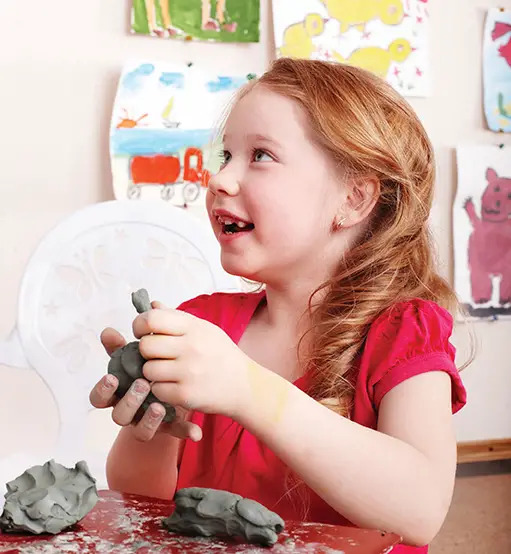What do you do when your child says she doesn’t like her camp and refuses to go back? A parent shares tips to solve the case of What’s Wrong at Camp to make your child’s summer at camp enjoyable.
 It turns out the author’s daughter was unhappy at art camp because she didn’t like getting her hands dirty during ceramics. The littlest things may upset young campers, so asking questions to understand any misgivings they may be having is key. |
“I don’t want to go back” was the last thing about summer day camp that I wanted to hear from my 6-year-old child. It took months of planning to find a camp that worked with our family schedule, and I didn’t want it all to unravel after just two days. It was a mystery to me why my child suddenly was begging not to go, and I needed to identify the possible culprit that threatened to foil our summer plans.
So what should you do if something is not quite right with your child’s camp? Before you storm in to demand a refund, do some detective work by observing the clues and asking some questions.
Clue: Your child is bored.
Investigate: Ask your child some questions to see if the issue is about friends and being alone. Some kids are bored if they don’t have a playmate. If this is what seems to be the issue, you can give your child some tips to make new friends and encourage her to give it some time. Sometimes, your child may feel socially isolated from the other kids. Do your best to determine if it’s just that she hasn’t “clicked” with another friend yet or if the cliques are actively preventing friendships from happening.
Inquire: If the issue is not about friendships, then check to make sure the camp is providing structured activities that your child wants to do. If your child’s description of the day is not what you understood was going to be provided by the camp, then ask the camp about the discrepancy. You can also ask if there are alternative activities. For example, if a child doesn’t feel like swimming that day, see if the camp can provide something else for your child to do during that time instead.
Solve: If your child takes longer to warm up to new friends, send her to short-duration camps with another friend or choose longer-duration camps so that she has time to get to know other kids. Ask the camp questions about what a typical day is like for campers, when they have structured activities and when they have free time. Make sure that balance is right for your child.
Clue: Your child is hurt or is scared of being hurt.
Investigate: If your child is worried about being hurt, find out why and if it stems from a particular person or the camp atmosphere as a whole. If your child is hurt, listen to the camp counselor’s explanation of what happened, and then take your child home. Ask for your child’s version of the story when he’s feeling safe and calm and when you can listen with an open mind. It’s important not to interrogate your child about what happened in front of the camp counselor, because you may not get your child’s real perspective on what happened.
Inquire: Accidents can happen, and you can work with the camp to find ways to prevent them in the future. But sometimes camp environments can make accidents more likely to happen. Rough or aggressive games could signal that there is not enough adult supervision, or that the activities are too rowdy for your child’s temperament (and maybe everybody else’s). One family told me about a camp that encouraged rough, competitive games and how it created an environment for their son to be bullied by others when he was too nervous to participate.
Solve: Check out a camp’s policy on handling disciplinary issues, whether from your child or someone else’s. That will give you some insight into whether they will take care of a situation in a manner that you’re comfortable with if something does come up. See if it is in writing as a formal policy, and not just the personal approach of the person you happen to ask.
Clue: Your child feels lost or overwhelmed.
Investigate: When camps include a wide range of ages, young campers in particular can feel lost in the crowd. Ask your child questions to see if he knows who his counselor is, where to go at certain times, and who he may ask for help. Often, younger children just need to know who they can turn to for some stability in a situation that has new routines and rules. Ask who your child feels most comfortable talking to when he needs help with something.
Inquire: Find out how the camp organizes its staff and responsibilities. For example, do they divide the campers into smaller groups by age or are they mostly kept in large groups? You can also ask about staff-to-camper ratios (the number of counselors compared to kids) and determine if that level is comfortable for you and your child. You may even want to see if a counselor your child likes can keep a special eye on him or check in with him periodically.
Solve: Ask about the camp’s staffing ratios and make a visit to the site before signing up. Also ask other parents about a camp’s strengths and weaknesses. One parent told of an all-day swim camp for 5- to 14-year-olds where her daughter lost all of her belongings except the swimsuit she was wearing. While the camp had a lot of experience teaching younger kids to swim, they didn’t have enough expertise with that age group to know how much responsibility was reasonable to expect from a 5-year old.
After some investigating, we determined that our neat-freak daughter didn’t like her art camp because she got messy during ceramics. We asked the teacher by email what projects were coming up and if there were easy adjustments we could make so that our daughter didn’t have to get her hands so dirty. It turned out that there were many non-goopy projects ahead. Knowing this information, my daughter happily continued with the next five weeks of camp. Another kid case successfully resolved.
Kim Tso is a freelance writer and mother of two who has honed her kid detective skills over time.
Also see:
20 Questions for Choosing a Day Camp



















